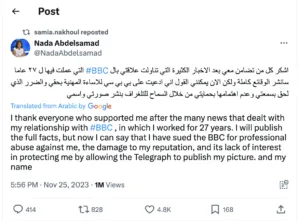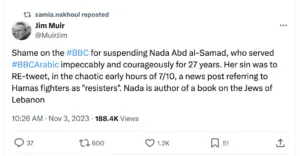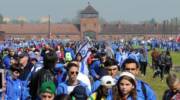Two top Reuters editors face backlash for sharing contentious social media content during the Israel-Hamas conflict, sparking concerns over journalistic integrity.
By Honest Reporting
Two top news editors at Reuters have shared unsettling social media posts throughout the Israel-Hamas war, HonestReporting revealed this week, casting doubt on their adherence to journalistic impartiality.
The revelation, which comes after a series of exposés by HonestReporting of the news agency’s Gaza-based photojournalists who had either infiltrated into Israel with Hamas on October 7 or praised its terrorists, raises concerns that anti-Israel bias in the wire service hasn’t plagued only its bottom ranks.
The online posts, by Reuters Executive Editor Simon Robinson and Global Foreign Policy Editor Samia Nakhoul, have been visible to many Reuters journalists who follow the two senior editors on LinkedIn and social media platform X. Yet the message of these posts is not a call for fair and balanced reporting on Israel, nor is it a demand for journalists’ objectivity.
Anti-Israel Content
On March 3, Robinson posted on his LinkedIn a 7,500-word anti-Israel essay from the London Review of Books that includes criticism of Western media coverage of the Jewish state.
Titled “The Shoah after Gaza,” the essay by Indian author Pankaj Mishra asks questions like: “How can the Western political and journalistic mainstream ignore, even justify, its [Israel’s] clearly systematic cruelties and injustices?”
It also includes claims such as: “The liquidation of Gaza… is daily obfuscated, if not denied, by the instruments of the West’s military & cultural hegemony,” including “prestigious news outlets deploying the passive voice while relating the massacres carried out in Gaza.”
Another paragraph reads: “Why have Western politicians and journalists kept presenting tens of thousands of dead and maimed Palestinians as collateral damage, in a war of self-defence forced on the world’s most moral army, as the IDF claims to be?”
And there’s also, as the title suggests, an inevitable shoehorning of the Holocaust: “A strenuously willed affiliation with the Shoah has also marked and diminished much American journalism about Israel.”
When @Reuters' Executive Editor posts on his LinkedIn a 7,500-word anti-Israel essay from @LRB that includes criticism of Western media coverage of Israel, what sort of message does that send his Reuters staff?
Clue: It's not a call for fair and balanced reporting on Israel.
pic.twitter.com/8ax1onYXvi
— HonestReporting (@HonestReporting) March 4, 2024
The post is still visible on Robinson’s profile, with comments ranging from “excellent article” to “that article is horrifically anti-Israel” and “Why can’t you call for fair and balanced reporting on Israel?”
But the senior editor–who is also Reuters’ Deputy Editor-in-Chief–has kept silent. He hasn’t removed the post nor tried to justify the unprofessional and inhuman spread of anti-Israel content online.
Pernicious Reposts
Perhaps Robinson felt safe doing so because earlier in the war, his colleague Nakhoul had seemingly set the tone.
On November 25, she reposted on X a message by BBC journalist Nada Abdelsamad, who had been investigated by her network over accusations of praise for the deadly October 7 Hamas attack on southern Israel that sparked the war.
In the Arabic message reposted by Nakhoul, Abdelsamad says she has sued the BBC over “professional abuse against me.”

According to The Telegraph, Abdelsamad had been exposed by the Committee for Accuracy in Middle East Reporting and Analysis (CAMERA) after retweeting a video of Israelis hiding in fear on October 7, entitled: “settlers hiding inside a tin container in fear of the Palestinian resistance warriors.” The Telegraph added it came with a hashtag translated as “promise of the hereafter,” a Quranic reference to the killing of the Jews.
Doesn’t Nakhoul think a journalist who publicly voices such sentiment should be held to account?
An earlier repost by Nakhoul may provide an answer.
On November 3, she reposted a tweet that defended Abdelsamad, claiming “Her sin was to RE-tweet, in the chaotic early hours of 7/10, a news post referring to Hamas fighters as “resisters.”

So does Nakhoul think it’s okay for a journalist to do what Abdelsamad had done?
And would she care to explain that to her Jewish-Israeli colleagues?
What sort of message do Robinson and Nakhhoul’s posts send their subordinates, who look up to them as responsible leaders, mentors, and guides?
As Reuters fails to get to grips with HonestReporting’s exposé of a terror-praising Gaza journalist and others who had called on Gazans to infiltrate Israel on October 7, could it be that something is systemically rotten in the once-respected wire service?























